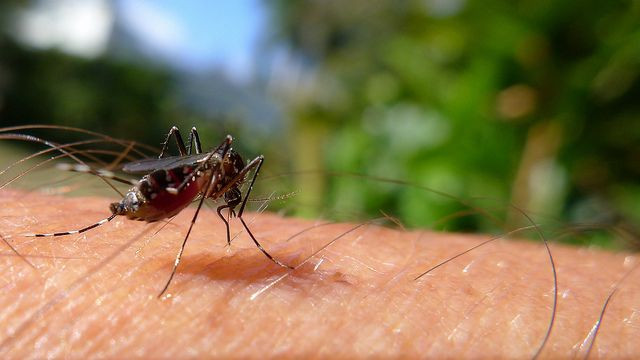NYC Scientists Create Mutant Mosquitoes That Can’t Smell Humans, Providing Clues To A Better Bug Repellent

Some mosquitoes prefer humans over other warm-blooded animals, and scientists at Rockefeller University have pinpointed a gene that feeds into this inclination. This human odor-sensing gene helps mosquitoes smell odors and avoid the bug repellent DEET, according to a report in Nature. Given that some mosquitoes are acquiring DEET-resistance, the finding could lead to the creation of better bug repellents to protect people from annoying bites and mosquito-borne disease.
Moquitoes are known for hunting warm-blooded prey, but they are drawn to carbon dioxide (CO2), which we exhale every time we breathe, and excreted lactic acid.
However, heat, CO2, and lactic acid can't be the only seductive elements, as some mosquitoes have a bias when it comes to which animals they decide to bite.
Two examples - the species Anopheles gambiae and Aedes aegypti - love humans, which is unlucky for us because they often carry infectious diseases like malaria and Dengue fever.
Mosquitoes rely on their antennae to track down each meal. Along with heat and CO2 sensors, these tiny projections are coated with cells equipped with 'odor receptors.'
These odor receptors distinguish between different fragrant compounds in the air, until they find the most savory aroma trail to lead them to an unsuspecting human.
The researchers turned to another winged insect - the fruit fly - for a key clue into mosquito olfaction. Mosquitoes, like fruit flies, are attracted to honey and floral scents, as nectar is a major food source for them. However, relative to mosquitoes, much more is known about how fruit flies detect odors.
In fruit flies, all odor receptors are linked to a single gene named orco. Without it, the flies can't accurately detect aromas in the air. The researchers made an educated guess that the 131 odor receptors in mosquitoes may also need their version of the orco gene to function properly.
By slightly tweaking this gene, the researchers were able to shut it off in A. aegypti mosquitoes.
The genetically modified mosquitoes were placed in a chamber with two screen openings. A preworn shirtsleeve was draped in front of one opening, while the other was exposed to fresh air. Compared to normal mosquitoes, orco-less blood-suckers showed little to no excitement for human-scented sleeves.
To alter the orco gene, the researchers used zinc-finger nucleases, which are enzymes that make very precise mutations in a scientist's gene of choice. This is the first study to use this technique to make mutant mosquitos, and the breakthrough will allow future scientists to answer many more questions about how and why mosquitoes hunt humans.
"Our mutants demonstrate a reduced preference for humans, showing that the orco pathway is very important for making decisions about finding a host," said senior author Dr. Leslie Vosshall, a neuroscientist at Rockefeller University.
The mosquitoes also had a reduced proclivity for humans versus other warm-blooded animals and were just as likely to be attracted to guinea-pigs in a lab setting. Their ability to sense a large range of fragrances and honey was also disrupted.
"We are interested in the details of how mosquitoes discriminate humans from animals," continued Vosshall. "What specific odors are important and how does the mosquito detect those?"
Although these blood-suckers had a harder time with tracking human scents, they weren't completely lost. In similar experiments, they could still detect carbon dioxide and were drawn to the combination of pre-worn sleeves and human breath.
The most dramatic finding in this study related to the mosquitoes response to DEET, which is one of the most common bug repellents on the market. Mosquitoes without orco were no longer warded off by the smell of DEET, but were repelled once they landed on a DEET-covered arm. The orco-less mosquitoes didn't notice DEET at all until they land on the skin.
"We have shown that DEET acts as a two-phase insect repellent," concluded Vosshall. "It acts in the air via the orco pathway to repel mosquitoes. It also acts on the skin in an orco-independent manner."
The next step is to determine how mosquitoes are sensing DEET on the skin, which will provide insights into how to design next generation repellents.
Source: DeGennaro M, McBride CS, Seeholzer L, Nakagawa T et al. orco mutant mosquitoes lose strong preference for humans and are not repelled by volatile DEET. Nature. 2013.



























